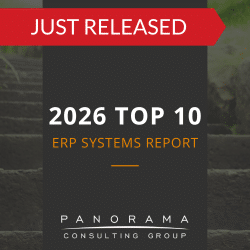Selecting new ERP software can be exciting – but it can also be overwhelming. Today, we’re outlining the bare-minimum technical and functional capabilities you should look for in general. Once you understand these capabilities, you can get more granular and look for functionality that fulfills your unique requirements, but let’s start with the basics.
What should an ERP system include? Key requirements and features of a reliable ERP system include:
• Integration
• Automation
• Data Analysis and Reporting
• Customer Relationship Management
• Accounting
• Human Resource Management
• Supply Chain Management
It can be easy to get caught up in the frenzy of the ERP selection process. The above list represents the basics you should look for when starting ERP selection.
ERP Selection Guide
This ERP Selection Guide will help you select technology that will support your organization for at least the next ten years.
What Should an ERP System Include?
1. Integration
With a variety of software solutions available on the market today, finding an all-in-one solution can be difficult. However, if you want reliable business intelligence, an integrated solution is essential.
With an integrated ERP system, you can make better decisions on allocating resources, optimizing your warehouse, and more.
Consolidation also can reduce your total investment, as purchasing one software suite is often less expensive than purchasing multiple solutions.
2. Automation
ERP software includes automation tools that enable you to streamline manual tasks.
Payroll, accounting, and other manual data entry are all tasks that are low in effort but high in time commitment. Automation allows you to remove the human element, which decreases errors, saves money, and boosts productivity.
With extensive labor hours now shifted away from menial tasks, your team can focus on more value-added projects.
3. Data Analysis and Reporting
Today, organizations have access to more data than ever before, but if it can’t be analyzed reliably, it is all a waste. ERP systems effectively collect data and organize it in ways that enable your team to easily analyze it.
Top ERP systems can even predict outcomes. Predictive maintenance is just one example of how businesses are leveraging these advanced analytics.
After data is gathered and analyzed, ERP software systems present findings through charts, graphs, and other visual elements. You can then customize these reports for various stakeholders.
Overall, reporting features can be a valuable tool for internal discussion as you look for opportunities for continuous improvement.
4. Customer Relationship Management
Managing customer information can be difficult. CRM tools store customer details in a convenient and central location, making this information easy to access for other operations, such as shipping.
CRM tools are also helpful with marketing activities, such as creating marketing campaigns, gauging customer engagement, and tracking data regarding individual sales.
5. Accounting
Improperly managed finances can be a disaster for businesses. With ERP software, you have access to financial management tools that help you take care of functions like:
• Accounts payable
• Accounts receivable
• General Ledger
• Fixed Assets
• Forecasting
Smaller organizations may not have as many issues with accounting as larger firms, but as complexity increases, so do the accounting team’s demands. An advantage of ERP systems is that they can easily accommodate any level of organizational complexity to achieve the utmost accuracy when handling accounting.
6. Human Resource Management
Without the ability to effectively hire and retain staff, a business will surely fail.
ERP software systems have integrated HR tools that act as a comprehensive solution for managing your HR needs, from recruitment to payroll, to onboarding, and beyond. Some ERP systems can handle more demanding HR tasks, like tax management and benefits.
7. Supply Chain Management
SCM systems have tracking capabilities that allow you to analyze your inventory management and other manufacturing operations.
This information is beneficial on its own, but then the supply chain system acts on this data to provide even more value. For example, SCM tools can recommend purchase orders, coordinate transfers, and combat supply chain inefficiencies.
In the manufacturing industry, the logistics involved can become overwhelming. ERP systems are great for assisting in supply chain planning. For instance, SCM tools can help you find ideal channels for distributing your product. These tools can also track inventory and automate replenishment.
Going Above and Beyond the Basics
When selecting new ERP software, it’s important to remember not to get caught up in the bells and whistles. You can eventually talk to ERP vendors about your unique business needs, but first, you need to understand what kind of solution you’re looking at. Is it an integrated solution that includes all the features mentioned above, or is it more of a point solution?
To answer the question, “what should an ERP include?” we’ll leave you with this final thought . . . the way a system handles a particular business process is secondary to the overall structure of the system and how it connects the various functions across your organization.
Request a free consultation below to learn more about our ERP consulting services.














